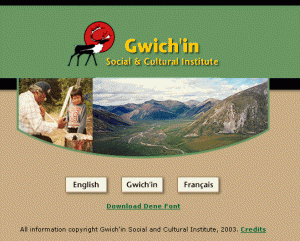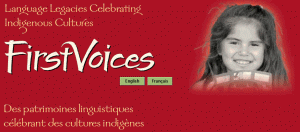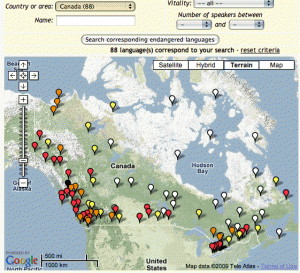Posts from — November 2009
Australian Indigenous Health InfoNet – Module 4-1
The purpose of the website is to contribute to the objective of closing the health gap between Indigenous and other Australians.
The website has a range of topics: Health facts, Chronic conditions, Infectious conditions, Population groups and Health systems to mention a few. It informs practice and policy in Indingenous health by making research and health information readily available it has a bibliographic data base to search for a full range of health publications on Aboriginal and Torres Strait Islander health.
This website is comprehensive. It has over 3800 pages of information.
Interesting point, it uses the Gecko as its logo because it can be found throughout Australia so it was deemed an appropriate symbol/logo for this site.
November 30, 2009 No Comments
Module 4 – Weblog Entry #1 – Bruce Spencer
I selected the Gwich’in Social and Cultural Institute as my first entry because of its significance to my research on the Gwich’in people. Their language is listed as one of eighty-eight dying languages in Canada. My research paper takes a look at the history of the language and what has been done to try to preserve and maintain the language during the past sixty years.
Also of interest are:
• Gwich’in Language Wikipedia taken from Answers.com
• The Gwich’in Settlement Area taken from the GDC website
• Information of the Gwich’in Land Claim taken from the GNWT’s Aboriginal Affairs and Intergovernmental Relations website.
November 30, 2009 No Comments
Module 4 – Weblog Entry #2 – Bruce Spencer
Wellness is an issue for everyone and the Gwich’in people are no different in this respect. There have been a number of attempts made to address the needs of the Gwich’in people. The most recent one was in April, 2008 when the Gwich’in Tribal Council made an announcement about the opening of a Gwich’in wellness camp outside of Inuvik, NWT.
Other sites of interest are:
• Tl’oondih Healing Society located near Fort McPherson, NWT.
• Tetlit Gwich’in Council in Fort McPherson
November 30, 2009 No Comments
Module 4 – Weblog Entry #3 – Bruce Spencer
Keeping with the theme of languages in danger of extinction, I thought it might be nice to send you to the FirstVoices website.
• “FirstVoices is a group of web-based tools and services designed to support Aboriginal people engaged in language archiving, language teaching & culture revitalization. More… or Try our Quick Start Guide “ (taken from the FirstVoices Website)
November 30, 2009 No Comments
Module 4 – Weblog Entry #4 – Bruce Spencer
I came across this weblog (Shaw.ca) while I was researching information for my assignment on the Gwich’in Language. It’s being touted as a cooperative Canadian weblog on things legal. Of special interest to me was the article by Simon Fodden (The Friday Fillip) on dying languages of which there are 88 in our country alone.
Also of interest is:
• UNESCO’s Interactive Atlas of the World’s Languages in Danger
November 30, 2009 No Comments
Module 4 – Weblog Entry #5 – Bruce Spencer
Censored News is another weblog site that may be of interest to you. I discovered it while researching my paper on the Gwich’in people. This blog site has been active since 2007. It reports primarily on indigenous issues and human rights issues. This is a searchable weblog.
Articles are listed by year and month. Scroll downwards and look to the left of the window.
Other links of interest to me were:
• Indigenous Uranium Forum audio available
o EarthCycles.net
• Listen Uranium Forum Defending Mother Earth
o blogtalkradio
November 30, 2009 No Comments
ETEC521 Blog Wordle
November 30, 2009 No Comments
Module 4 Weblog#5 by Dilip Verma
I finally found what I was looking for, evidence of Mexican Indigenous youth using the Web 2.0 for Intra cultural dialogue. There are so many speakers of Indigenous languages in Mexico, but so little digital evidence.
Nizkaloa Nahuatl
Web Site: http://miztonpixan.blogspot.com/
This site is a blog by Miztonpixan, which the user regularly updates. I cannot tell you about the content as it is all in Nahuatl, but going by the images it is a blog by a modern youth. Unfortunately, no one has left any comments, so it is a lone crusade. However it is an example of what mexican Indigenous youth could be doing to create communities of practice. This is the only blog in a Mexican Indigenous language I have found so far.
I also just had to include this site:
Twelve canoes
Web Site: http://www.12canoes.com.au/
This is an Aboriginal site that tells the story of some Indigenous communities in their own language using images, videos and sound. There is also the possibility of listening in English. I cannot find out much about who made it, but it is so beautiful I just had to put it up. It is eye catching and multimodal. Really This is the kind of site Oaxacan communities need to share their IK.
November 29, 2009 No Comments
Indigenous Wellness Research Institute (M4, #5)
Vision: To support the inherent rights of Indigenous peoples to achieve full and complete health and wellness by collaborating in decolonizing research and knowledge building and sharing.
This is an amazing site containing detailed information on how the Indigenous Wellness Research Institute (IWRI) is helping Indigenous people realize self-actualization. By understanding how traumatic events of the past (including the impacts of colonization and residential schools, etc) have damaged the spirits of many Indigenous people and led to a justifiable mistrust, it quickly becomes apparent why the quest for decolonization is so imperative.
Return to Wellness – this relatively short video clip is a must view as it effectively explains the goals of the IWRI and how they are working to empower Indigenous people.
Through making the IWRI’s goal of attainment of higher education the norm for Indigenous people, the hope is this will lead to realization of what is perhaps the highest level of wellness – that which comes from being afforded the opportunity to share one’s wisdom and insights in supporting others to achieve their full potential.
November 28, 2009 No Comments
a Blog – AbTeC – mod4 post5
finally I found a aboriginal blog that is built to participate in networked culture
http://www.abtec.org/blog/?page_id=2
Form their site
“The main objective of AbTeC is to discover, define and implement methods by which Aboriginal people can use networked communication technology to strengthen our cultures. AbTeC’s Skins project will bring Aboriginal community organizations together with academic institutions to conduct research into the means by which the power of digital and networked technology can be put to use in producing and preserving our knowledge, culture and language. We will work with elder who have stories to tell, bands who have histories to preserve, and Aboriginal language speakers who want to share their knowledge. The goal is to provide conceptual and practical tools that will allow us to create new, Aboriginally-determined territories within the collection of web-pages, online games, chat rooms, bulletin boards and virtual environments that we call cyberspace.”
Love it!
The site cites current projects that include the use of computers in cyber pow wows, 3D story telling and computer programing
November 28, 2009 No Comments
RICTA | Research on ICT with Aboriginal Communities (DGM Module 4-4)
RICTA was established in September 2004 to work with Aboriginal communities, use ICTs strategically and creatively, build local capacity for research, facilitate Aboriginal participation, and to facilitate connection and trust among diverse members. Members include “more than 40 people working with universities, community research institutes, Aboriginal organizations, government and the private sector. Although a Canadian project, there are several non-Canadian institutions represented, including: University of San Francisco; Universidad Metropolitana, Mexico; New Jersey Institute of Technology; University of Vienna; and University of Missouri-Columbia.
The website currently lists five ongoing member projects, and 34 other projects nation-wide. Where applicable, project websites and contact information are included. Also useful is a bibliography of Canadian publications (1980-2005) related to research in ICT use in Aboriginal Communities.
Unfortunately, it appears that this website has not been updated since 2006.
November 28, 2009 No Comments
RedWAY BC News E-zine – mod4 post4
Still on the hunt for some aboriginal blogs I came across RedWAY BC News E-zine; a free on-line electronic magazine connecting 8,400+ international subscribers
The biline reads: “Harnessing Technology to Honour, Inform and Connect Urban Aboriginal Youth to Services, Opportunities, the Community and Each Other.”
This online publication seems like a well put together site with up-to-date information. Some of its contents include:
- Smoke Signals
- RedWAY BC News Team
- Events Calendar
- JPEN – Job Postings
- From the Street – Youth Voices
- Business, Entrepreneurship & Ec. Dev.
It looks like a fairly good source as long as those who are the intended audience(aboriginal youth), have the access to the material.
The links to up-to-date topical news items to be of most value as a means to inform a generation of the issues that should be of great importance to them. The site is built and maintained by aboriginal youth in a group called the AYM Team. You can see a video on the groups at: www.youtube.com/redway99
As of June ’09, they have published +80 issues of RedWAY BC News. Over 70 Aboriginal Youth contribute to RedWAY stories highlighting thousands of initiatives, programs, job postings and events.
You can subscribe to their free newsletter and their YouTube channel
November 28, 2009 No Comments
Early Childhood Development Intercultural Partnerships (M4, #4)
As an elementary school educator, this site immediately piqued my interest. It also helped me better understand some of the issues surrounding ethical and respectful research practices. “Nothing about us without us” is a quote that stuck with me as effectively describing how Indigenous people feel research should be conducted.
Collaborative, innovative projects between the research team and Aboriginal people are well explained including: Indigenous Child Assessment, Indigenous Fathers, Early Language Facilitation, Social Support in ECD, and others.
It seems the work of Dr. Jessica Ball, Faculty U Vic and others is making a real difference in the lives of Aboriginal people, especially the children. The primary goal here seems to be that of building relationships and working collaboratively with Aboriginal groups in order to identify issues of concern and work together towards lasting solutions. The various project stories (which include project background, goals, activities and outcomes) are intriguing and inspiring. This site is truly a wonderful resource!
November 28, 2009 No Comments
Lessons in Learning: The Cultural Divide in Science Education for Aboriginal Learners (M4, #3)
http://www.ccl-cca.ca/CCL/Reports/LessonsInLearning/LinL20070116_Ab_sci_edu.htm
“The First Nations people view themselves not as custodians, stewards or having dominion over the Earth, but as an integrated part in the family of the Earth. The Earth is my mother and the animals, plants and minerals are my brothers and sisters.”
– F. Henry Lickers
Biologist, member of the Turtle Clan of the Seneca Nation
There needs to be more Canadian Aboriginal people in science and engineering occupations. However, attracting them to such positions is a challenge due in part to the contradictions between the values and philosophy of Western science and those of Aboriginal people and communities.
No wonder Aboriginal youth would find mainstream science classes confusing, being that their beliefs and ways of learning are so different from those of their Western classmates. Aboriginal values need to be validated and incorporated in order to increase their participation and engagement. Information on this website provides many suggestions of ways this can be accomplished.
There are some interesting examples of how traditional knowledge has been combined with Western science to produce mutually beneficial results. Hopefully more of these partnerships can occur in the future.
November 28, 2009 No Comments
Module 4 Entry #5
A wonderful project between the Nuu-chah-nulth tribal council and Department of Canadian Heritage through Canadian Culture Online. Links to culture and language as well as a pull down menu which discusses items such as Information Technology and Infant Development. It’s incredible and uses Quick Time technology. All sections of the site have sound files done in English and the Nuu-chah-nulth language as well as an option for French language. Definitely worth taking a look at.
November 28, 2009 No Comments
East Cree Language Web (DGM Module 4-3)
This website is maintained by the Cree School Board in northern Québec, as a means to support Cree teachers and students learning their own language, and to introduce the language to non-Cree readers. As the site states:
This site is intended as a resource for Cree language teachers, literacy instructors, translators, linguists, and anyone who has an interest in the nuts and bolts of the Cree language. We hope that the live possibilities of the internet will encourage participation. We are seeking support form all who value linguistic diversity and want the Cree language to be alive and well in the 21st century and after.
The site includes links to:
Amongst the Resources are some lesson plans such as those included in East Cree Mathematics. All sections of the website are available in English, French, South Cree and North Cree. Fonts for both Cree dialects are available to download.
November 28, 2009 No Comments
Module 4 Entry #4
Linking Oral Tradition with Science
An interesting website brought to my attention by a colleague when I mentioned what I was working on for my analytical paper. He actually stumbled on it while cruising the OceanLine site itself. We are always looking for material that includes a First Nations perspective. We share all math and science material that we encounter at our monthly meetings. Not all of it is appropriate or accurate but we strive to uncover as much quality material as we can collectively.
It was definitely an interesting read and the links to OceanLink andthe Things to Consider were excellent. Things to Consider will be on the agenda for the next math/science meeting. TEK is discussed at length.
November 28, 2009 No Comments
Society for Ecological Restoration International: Indigenous Peoples’ Restoration Network (M4, #2)
http://www.ser.org/iprn/founder.asp
This is another site that fits nicely with our Module 4 focus on Ecological Issues in Indigenous Education and Technology. Dennis Martinez, chair of the IPRN, discusses the rising interest in Traditional Ecological Knowledge (TEK). He suggests that TEK offers a complementary approach to Western Science in the quest to understand our natural world. He notes that Indigenous societies were the first to notice the effects of climate change, and that they have a wealth of environmental information base on the observations of countless generations.
Martinez goes on to discuss how TEK is being threatened by globalization, which has often resulted in Indigenous groups losing control over their ancestral lands and resources. He stresses the need to restore and repair the relationship between nature and humans.
There is a wealth of additional information on this website, organized through numerous links on the left side of the homepage. Well worth a look – so much to learn and consider here!
November 28, 2009 No Comments
Indigenous Education Institute (M4, #1)
http://www.indigenouseducation.org/index.html
This Indigenous Education Institute (IEI) was created as a non-profit venture “with a mission to preserve, protect and apply traditional Indigenous knowledge in a contemporary setting, that of Indigenous peoples today, around the world”. Representatives from IEI have traveled around the world giving presentations to Indigenous organizations and institutions, as well as mainstream universities and K-12 schools.
Although IEI is located in Santa Fe, New Mexico, the administrators and board members represent various Indigenous groups. IEI is doing some important work in examing Native and Western Science in order to share awareness of Indigenous research methods and evaluation with the Western World. I was happy to learn that a priority of IEI is to assist Indigenous youth in building positive self-esteem and a strong sense of identity based on traditional cultural knowledge. Overall, this is an informative and well-organized website!
November 28, 2009 No Comments
Module # 4 Weblog # 5
http://www.pre.ethics.gc.ca/eng/index/
Panel on Research Ethics
This is the Canadian government’s page about research ethics. There is a link on this page (TCPS) that offers the policy statement about the “Ethical Conduct for Research Involving Humans.” I chose this website because I felt that it might be an interesting contrast to some of the guidelines to first Nations research that we have examined in this module by viewing the Canadian governments view on human based research. This is a very dense site, with much information presented. If interested in analyzing I recommend reading the FAQ and the TCPS Tutorial.
Here is the mandate of the site.
The written terms of reference of the Interagency Advisory Panel on Research Ethics (PRE) outline its formal mandate, define its general functions and duties, and have shaped some of PRE’s milestones since its creation in November 2001.
PRE is mandated by the Canadian Institutes of Health Research (CIHR), the Natural Sciences and Engineering Research Council (NSERC) and the Social Sciences and Humanities Research Council (SSHRC) to promote high ethical standards of conduct in research involving humans through the development, evolution, interpretation, and implementation of the Tri-Council Policy Statement: Ethical Conduct for Research Involving Humans (TCPS). The Agencies adopted the TCPS in August 1998 as a common research ethics policy for those conducting, participating in, or reviewing human research in institutions funded by CIHR, NSERC or SSHRC.
PRE further assists the TCPS-user community by identifying TCPS educational needs and activities. It also participates in the ongoing dialogue on a national oversight or governance system for research involving humans.
PRE’s 12 member advisory panel is drawn from diverse backgrounds and disciplines so that it may provide the Agencies with multidisciplinary and independent reflection and advice on research ethics policy of the TCPS. PRE develops its advice based on a set of First Principles applied to lessons on, and the evolution of, human research ethics in a national and international context.
November 28, 2009 No Comments






